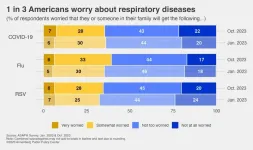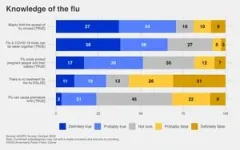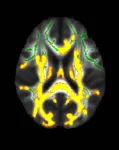(Press-News.org) PHILADELPHIA – Over a third of American adults are worried that they or someone in their family will get the seasonal flu, Covid-19, or RSV (respiratory syncytial virus) in the next three months, according to a new health survey from the Annenberg Public Policy Center (APPC) of the University of Pennsylvania.
Those three viral illnesses made up the “tripledemic” of respiratory illnesses that overwhelmed some health care facilities last winter. Although RSV typically peaks later in the year, this month hospitals in parts of Texas are already seeing emergency rooms filled with children with RSV.
RSV is a common respiratory virus that often causes mild, cold-like symptoms but can be serious and require hospitalization among infants and older adults, according to the Centers for Disease Control and Prevention (CDC).
There’s no consensus among U.S. adults on which virus is more likely to cause severe illness: 22% say Covid-19, 13% say RSV, 7% say seasonal flu, and 41% say they are equally likely to cause severe illness. Sixteen percent are not sure.
The Annenberg Science and Public Health Knowledge (ASAPH) survey, which was conducted October 5-12, 2023, with a panel of over 1,500 U.S. adults, finds that Americans generally are more knowledgeable about RSV today than earlier this year. Over the spring and summer, health authorities approved new vaccines against RSV specifically for adults age 60 and older and for pregnant people as a way to protect their newborns.
Highlights
RSV concern: 35% worry that they or someone in their family will get RSV in the next three months, up from 32% in January 2023. About two-thirds (65%) are not worried.
Covid-19 concern: 35% are worried that they or someone in their family will get Covid-19 in the next three months, up from 21% in August 2023 but similar to last winter (36% in January 2023). About two-thirds (65%) are not worried.
Flu concern: 39% are worried that they or someone in their family will contract the seasonal flu in the next three months, statistically unchanged from January 2023. Six in 10 people (61%) are not worried.
Complications: Nearly 1 in 3 people (31%) say they personally know someone who believes they are suffering long-term health complications as a result of getting infected with Covid-19. One in 6 (17%) say they personally know someone who believes they are suffering long-term health complications as a result of getting infected with Covid-19.
Fewer say they’ve had a flu shot: At the time the survey was fielded (Oct. 5-12, 2023), 21% said they had received the flu shot this season, compared with 26% in mid-October 2022 and 38% in the second week of November 2021.
“Because getting a flu shot yearly not only helps to protect us from serious infection but also predicts our acceptance of other CDC-recommended vaccines, the drop in reported flu vaccination we see reflected in our panel is worrisome,” said Kathleen Hall Jamieson, director of the Annenberg Public Policy Center and director of the survey.
APPC’s Annenberg Science and Public Health Knowledge survey
The survey data come from the 13th wave of a nationally representative panel of 1,559 U.S. adults, first empaneled in April 2021, conducted for the Annenberg Public Policy Center by SSRS, an independent market research company. This wave of the Annenberg Science and Public Health Knowledge (ASAPH) survey was fielded October 5-12, 2023, and has a margin of sampling error (MOE) of ± 3.4 percentage points at the 95% confidence level. All figures are rounded to the nearest whole number and may not add to 100%. Combined subcategories may not add to totals in the topline and text due to rounding.
The policy center has been tracking the American public’s knowledge, beliefs, and behaviors regarding vaccination, Covid-19, flu, RSV, and other consequential health issues through this survey panel over the past two-and-a-half years. In addition to Jamieson, APPC’s team on the survey includes research analyst Shawn Patterson Jr.; Patrick E. Jamieson, director of the Annenberg Health and Risk Communication Institute, and Ken Winneg, managing director of survey research.
A prior news release on this survey showed how public confidence in vaccines has declined and more people are accepting of misinformation about vaccines over the past couple of years.
Download the topline and the methods report.
RSV and vaccines
Knowledge about RSV is generally up, though not enthusiasm for the vaccine.
Two vaccines against RSV for adults 60 and older were approved in May by the Food and Drug Administration (FDA) and in June, the CDC recommended that such older adults “may receive a single dose of RSV vaccine” upon consultation with their health care provider.
In August, the FDA approved, and the CDC later recommended, an RSV vaccine for pregnant individuals to be given during weeks 32 to 36 of pregnancy to protect babies born during RSV season. (During the summer, the FDA and CDC also signed off on a monoclonal antibody injection – which is not a vaccine – to be administered to newborns to protect against RSV.)
The survey on RSV and the vaccines found a mixed reception for the RSV preventives:
The vaccine for older adults: Over half of those surveyed (55%) say they would be likely to recommend that a friend or family member age 60 or older talk with their health care provider about whether to get the RSV vaccine, a statistically significant decline from 61% in August 2023.
The vaccine during pregnancy: People are split on whether to recommend the RSV vaccine to a pregnant friend or family member. Told that the CDC recommended this new vaccine against RSV for pregnant individuals to protect their infants: 45% would not recommend it and 43% would. (The question was not previously asked in this form.)
The monoclonal antibody injection for infants: 42% say they would be likely to recommend the monoclonal antibody injection for an infant and 35% would not, no significant change since August.
What do people know about RSV?
Knowledge about RSV and the vaccines has grown slightly since summer on some survey items. On most of these questions, more people are unsure than knowledgeable:
Does an RSV vaccine for older adults exist? More people know there is an FDA-approved vaccine against RSV for older adults (42%, up from 23% in August and 13% in June), though over half of those surveyed (53%) are not sure.
RSV symptoms: There’s been growth in the number of people who know that RSV is more likely to produce mild, cold-like symptoms (23%, up from 18% in June 2023) than serious difficulties in breathing – but even more incorrectly choose the latter (38%) and another 38% are not sure.
The virus’s staying power: More know that RSV can survive for many hours on hard surfaces such as tables or crib rails (26%, up from 17% in June 2023) than those who say it cannot (7%) – but two-thirds of those surveyed (67%) are not sure.
Repeat illness: More know that once a person contracts RSV it’s possible to get it again (48%, up from 38% in June 2023), though half (50%) are unsure.
Pre-symptomatic spread: Nearly half (46%, unchanged from August 2023) know it is possible to spread RSV before showing symptoms, though half (51%) are unsure.
When RSV season occurs: Nearly two-thirds (63%, up from 43% in June) know that fall and winter are the times of year when someone is most likely to contract RSV, though 21% are not sure.
RSV’s prevalence among infants: Almost no one knows how common RSV is among infants. Asked how many children get RSV before the age of two: 14% say few, 31% say some, 10% say most, 4% (correctly) say virtually all and 42% are not sure. According to the CDC, nearly all children are infected before their second birthday.
In addition to the CDC sites linked above, for more information see the Q&As at FactCheck.org, a project of APPC, on the RSV vaccines for older adults and pregnant people.
Knowledge of the flu
As noted earlier, 21% of the U.S. adults surveyed say they received the seasonal flu shot as of Oct. 12, 2023, compared with 26% as of Oct. 18, 2022, and 38% as of Nov. 9, 2021. The survey response runs close to the CDC estimate that, as of Oct. 14, 2023, 22.2% of the adult population had received a flu shot.
But the survey also finds that the same proportion of people (50% likely, 50% unlikely) say they plan to get the flu shot this season as in October 2022. If that holds, it suggests that fewer people will be on track to be vaccinated against flu this year than last year. Total U.S. adult vaccination against the flu ran lower last season (46.9%) than in the prior, 2021-22 season (49.4%), though it is higher than it was a decade ago.
Most know (79%) the effectiveness of the flu shot can vary from year to year. Fewer people say the current flu shot is effective at reducing the risk of getting seasonal flu this year (65%, down from 73% in January 2023) and fewer say the current shot is effective at reducing the risk of getting a severe case of seasonal flu (71%, down from 77% in January). The CDC says the effectiveness of the shot varies each season, but vaccination generally reduces the risk of getting the flu by 40% to 60% when the circulating flu viruses are well-matched to those used to make the vaccines. The shot can keep you from getting sick with the flu, and has been shown to reduce the severity of illness in vaccinated people who get sick, the CDC says.
The survey found:
The flu and pregnancy: A quarter of those surveyed (24%) know that a pregnant person who gets the flu is at higher risk of delivering the baby early, unchanged from June 2023. But 32% say this is false and 45% are not sure.
Flu shot protection: Half (51%) know the flu shot protects both pregnant people and their babies from serious health problems during and after pregnancy. Nearly a third (30%) are not sure. This is unchanged from June.
One visit, two shots: For the first time, the CDC said this fall that the flu shot and Covid-19 vaccine could be administered in the same visit to a health care provider. Two-thirds (66%) know a person can get a seasonal flu shot and the Covid-19 booster in one visit to a health care provider or pharmacy.
Masks and the flu: Over 7 in 10 people (71%) know that wearing a high-quality, well-fitting mask helps limit the spread of flu viruses, down from 77% in January 2023. The number who consider that statement false is up, to 19% from 14% in January. Our prior survey release also found that 75% say they never or rarely wear a mask indoors when with people who are not from their household.
No treatment for flu: Nearly a third (30%) incorrectly say there is no treatment for the flu, up from 23% in January 2023.
Tamiflu: Most survey respondents (61%) correctly disagree with the statement that because Tamiflu is available to treat the seasonal flu, there’s no longer a need for people to get a flu shot. But the number who disagree is down from 65% in January 2023.
Flu shot for older people: Less than 1 in 5 people (18%) know that individuals 65 and older should get an annual flu shot with a higher dosage than the one for younger people, while 30% say those 65+ should get the same dose as the one for younger people, 4% say they should get a lower dose than the one given to younger people, 7% say they should not get an annual flu shot and 42% are not sure.
What effect does the shot have? Nearly half (48%) say the flu shot doesn’t stop you from getting the flu but makes it less severe; 22% say it keeps a vaccinated person who is exposed to the flu from getting sick with it; 7% say the shot has “no effect one way or the other” on whether an exposed person gets the flu; 4% say getting the shot increases the chances that a person who is exposed to the flu will get sick with it; and 20% are not sure.
Why get a flu shot?
When those who have received the flu shot were asked why they decided to get it this season, this is how they responded (more than one response is permitted):
I get it every year (78% yes; 22% no, the same as October 2022)
I want to protect myself against catching the flu (64% yes; 36% no, up from October 2022, when it was 47% yes; 53% no).
I want to protect myself against Covid-19 (13% yes; 87% no, up from October 2022, when it was 3% yes; 97% no). The flu shot does not protect against Covid-19. The increase in the people who believe there is some interaction between the flu shot and Covid-19 can also be seen in a previously released finding: More people incorrectly think getting a flu shot increases your risk of getting Covid-19 (9% say this is true, up from 6% in January 2023). There is no evidence of this, as written up by FactCheck.org.
It is recommended by the U.S. Centers for Disease Control and Prevention (31% yes; 69% no, statistically unchanged from January 2023).
Getting the Covid-19 booster
More U.S. adults say they are likely to recommend the fall Covid-19 booster to older adults in their family (52%) than to babies-to-preteens (44%) or to get it themselves (40%).
Covid-19 booster for adults: More people say they are unlikely to get the new fall Covid-19 booster (44%) than to get it (40%). (Asked of a half-sample.)
Covid-19 booster for children: People are about evenly divided on how likely they are to have a child in their family get the booster this fall. If they had a child age 6 months to 12 years who is eligible for the booster, 44% say they are likely to have the child get the booster and 43% say they are unlikely to do so.
Covid-19 booster for age 65+: Over half (52%) say that if someone in their family age 65 or older is eligible for the booster, they would recommend that that person take it, while 39% say they are unlikely to recommend it.
The Annenberg Public Policy Center was established in 1993 to educate the public and policy makers about communication’s role in advancing public understanding of political, science, and health issues at the local, state, and federal levels. Read about our science and health surveys.
END
Over a third of Americans worry about getting the flu, RSV, or COVID-19
RSV knowledge has improved but great uncertainty remains, survey finds
2023-11-20
ELSE PRESS RELEASES FROM THIS DATE:
State-of-the-art nanomaterial enabling ecofriendly removal of fine dust precursors
2023-11-20
Over the past decade, fine dust conditions in Korea have worsened, as perceived by the general public, with an increase in the number of days per year featuring high-concentration fine dust. Additionally, the previous maximum fine-dust concentration level has been surpassed. In response, the Korean government has expanded its financial investment in efforts aimed at addressing fine-dust issues.
Fine dust consists of particles that are too small to be seen with the naked eye. When these particles enter the human body through the skin and respiratory system, they can cause various diseases. According to a survey conducted by the Korea Environment Institute, three in ten people ...
AI-powered crab gender identification: revolutionizing fishery management and conservation
2023-11-20
When winter comes to Japan, fishermen in the northern regions set out to capture one of the most anticipated seasonal delicacies: the horsehair crab. Known locally as “kegani” and bearing the scientific name Erimacrus isenbeckii, this species of crustacean is highly sought after throughout the country. To protect the horsehair crab population from overfishing, the Japanese and prefectural governments have implemented various restrictions on their capture. For example, in Hokkaido, where kegani is abundant, capturing females for consumption is strictly prohibited.
To ...
Gambling addiction may increase the risk of long-term sick leave
2023-11-20
Gambling addiction can increase the risk of long-term sick leave for several years, according to a new study published in Psychological Medicine. Researchers from Karolinska Institutet behind the study point to the need to detect people with gambling addiction in time to avoid financial and health problems.
Gambling addiction is a psychiatric condition characterized by prolonged and problematic gambling that leads to negative financial, health and social consequences. 1.3 percent of the Swedish population, corresponding to 105,000 Swedes, have gambling problems or an increased risk of gambling problems, but the number ...
Tiny traps can provide new knowledge about difficult-to-treat diseases
2023-11-20
Proteins that form clumps occur in many difficult-to-treat diseases, such as ALS, Alzheimer’s, and Parkinson's. The mechanisms behind how the proteins interact with each other are difficult to study, but now researchers at Chalmers University of Technology, Sweden, have discovered a new method for capturing many proteins in nano-sized traps. Inside the traps, the proteins can be studied in a way that has not been possible before.
"We believe that our method has great potential to increase the understanding of early and dangerous processes in a number of different diseases and eventually lead to ...
Infection-resistant, 3D-printed metals developed for implants
2023-11-20
PULLMAN, Wash. – A novel surgical implant developed by Washington State University researchers was able to kill 87% of the bacteria that cause staph infections in laboratory tests, while remaining strong and compatible with surrounding tissue like current implants.
The work, reported in the International Journal of Extreme Manufacturing, could someday lead to better infection control in many common surgeries, such as hip and knee replacements, that are performed daily around the world. Bacterial colonization of the implants is one of the leading causes of their failure and bad outcomes after surgery.
“Infection ...
Hidden belly fat in midlife linked to Alzheimer’s disease
2023-11-20
CHICAGO – Higher amounts of visceral abdominal fat in midlife are linked to the development of Alzheimer’s disease, according to research being presented next week at the annual meeting of the Radiological Society of North America (RSNA). Visceral fat is fat surrounding the internal organs deep in the belly. Researchers found that this hidden abdominal fat is related to changes in the brain up to 15 years before the earliest memory loss symptoms of Alzheimer’s disease occur.
According to the Alzheimer’s Association, there are ...
New treatment restores sense of smell in patients with long COVID
2023-11-20
CHICAGO – Using an image-guided minimally invasive procedure, researchers may be able to restore the sense of smell in patients who have suffered with long-COVID, according to research being presented next week at the annual meeting of the Radiological Society of North America (RSNA).
Parosmia, a condition where the sense of smell no longer works correctly, is a known symptom of COVID-19. Recent research has found that up to 60% of COVID-19 patients have been affected. While most patients do recover their sense of smell over time, some patients with long COVID continue to have these symptoms for months, or even years, after ...
Why do some people get headaches from drinking red wine?
2023-11-20
A red wine may pair nicely with the upcoming Thanksgiving meal. But for some people, drinking red wine even in small amounts causes a headache. Typically, a “red wine headache” can occur within 30 minutes to three hours after drinking as little as a small glass of wine.
What in wine causes headaches?
In a new study, scientists at the University of California, Davis, examined why this happens – even to people who don’t get headaches when drinking small amounts of other alcoholic beverages. Researchers think that a flavanol found naturally in red wines can interfere with the proper metabolism of alcohol and can lead to a headache. The study was published in ...
Mental health of surfers creates US$1trillion wave for economy
2023-11-20
New research led by Griffith University on Australia’s Gold Coast and Andrés Bello University in Chile, has shown that surfing contributes about US$1 trillion a year to the global economy, by improving the mental health of surfers.
For the Gold Coast alone, the research team estimated the benefits to be valued at ~US$1.0–3.3 billion per year. Mental health benefits from surfing comprise 57–74% of the total economic benefits of surfing. The mental health benefits are 4.4–13.5 times direct expenditure by surfers, and 4–12 times economic effects via property and inbound tourism.
The research ...
Proof of concept of new material for long lasting relief from dry mouth conditions
2023-11-20
Proof of concept of new material for long lasting relief from dry mouth conditions
A novel aqueous lubricant technology designed to help people who suffer from a dry mouth is between four and five times more effective than existing commercially available products, according to laboratory tests.
Developed by scientists at the University of Leeds, the saliva substitute is described as comparable to natural saliva in the way it hydrates the mouth and acts as a lubricant when food is chewed.
Under a powerful microscope, the molecules in the substance - known as a microgel - appear as a lattice-like ...
LAST 30 PRESS RELEASES:
Emerging class of antibiotics to tackle global tuberculosis crisis
Researchers create distortion-resistant energy materials to improve lithium-ion batteries
Scientists create the most detailed molecular map to date of the developing Down syndrome brain
Nutrient uptake gets to the root of roots
Aspirin not a quick fix for preventing bowel cancer
HPV vaccination provides “sustained protection” against cervical cancer
Many post-authorization studies fail to comply with public disclosure rules
GLP-1 drugs combined with healthy lifestyle habits linked with reduced cardiovascular risk among diabetes patients
Solved: New analysis of Apollo Moon samples finally settles debate about lunar magnetic field
University of Birmingham to host national computing center
Play nicely: Children who are not friends connect better through play when given a goal
Surviving the extreme temperatures of the climate crisis calls for a revolution in home and building design
The wild can be ‘death trap’ for rescued animals
New research: Nighttime road traffic noise stresses the heart and blood vessels
Meningococcal B vaccination does not reduce gonorrhoea, trial results show
AAO-HNSF awarded grant to advance age-friendly care in otolaryngology through national initiative
Eight years running: Newsweek names Mayo Clinic ‘World’s Best Hospital’
Coffee waste turned into clean air solution: researchers develop sustainable catalyst to remove toxic hydrogen sulfide
Scientists uncover how engineered biochar and microbes work together to boost plant-based cleanup of cadmium-polluted soils
Engineered biochar could unlock more effective and scalable solutions for soil and water pollution
Differing immune responses in infants may explain increased severity of RSV over SARS-CoV-2
The invisible hand of climate change: How extreme heat dictates who is born
Surprising culprit leads to chronic rejection of transplanted lungs, hearts
Study explains how ketogenic diets prevent seizures
New approach to qualifying nuclear reactor components rolling out this year
U.S. medical care is improving, but cost and health differ depending on disease
AI challenges lithography and provides solutions
Can AI make society less selfish?
UC Irvine researchers expose critical security vulnerability in autonomous drones
Changes in smoking status and their associations with risk of Parkinson’s, death
[Press-News.org] Over a third of Americans worry about getting the flu, RSV, or COVID-19RSV knowledge has improved but great uncertainty remains, survey finds










